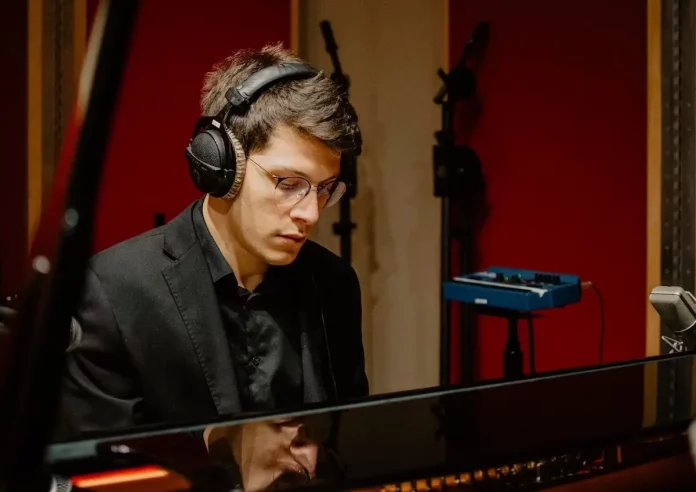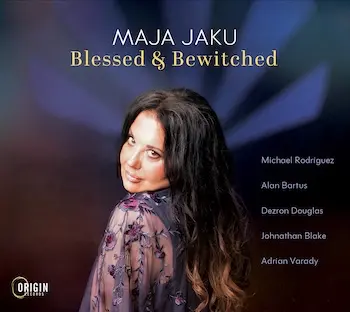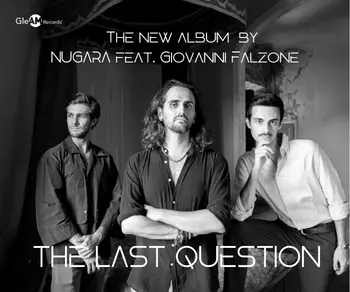Lorenzo Bellini: Source (GleAM Records AM7036)
Vienna-based pianist, composer, arranger and bandleader Lorenzo Bellini is a young man with many talents. Graduating from Boston’s Berklee College of Music in 2021, he was awarded a scholarship to the Royal Academy of Music in London the following year. As well as being bandleader for two groups, he teaches with the online Gospel University. Source is a recording with his Italian quartet, a follow up to his 2021 debut album Love Grain. It is a short, sweet album offering six compositions that run for just over 30 minutes.
Bellini’s gently swinging material is brought to life with some excellent playing from the quartet. Luca De Toni drives much of the sound with soaring guitar solos that offer a mix of delicacy and power as the mood requires. Bassist Matteo Padoin and drummer Andrea Dionisi lay down solid, mature but swinging foundations for the whole set, offering a depth that is perhaps surprising in such a young quartet. Balancing delicate melodies with some more experimental sounds, Odrius surprises the listener with an altogether more psychedelic prog-rock vibe, kicking off with wailing guitar and moody, spiky drumming – a short but very enjoyable track. Things calm down for the finale with Offering, a gently probing ballad that finds the quartet in a reflective frame of mind. Bellini leads this one, teasing out the melody on piano before Luca De Toni takes over to develop and lead the song to a dreamy, echoey and highly satisfying conclusion.
Joshua Redman: Words Fall Short (Blue Note Records)
There is a surprisingly buttery, Stan Getz-like mellowness to the opening track on Words Fall Short. Redman explores a tender, simple, melody with great delicacy before it becomes something a little spikier as it develops. The theme also closes the album, this time with vocals from Gabrielle Cavassa with a haunting, beautifully restrained performance. The lyrics, printed in the CD liner notes, show what a reflective and thoughtful composer Redman is with the elegant words to this song.
A Message To Unsend and Era’s End bookend an engaging album that combines restrained ballads with some spicier moments. It also shows Redman working comfortably with his new quartet of Paul Cornish (piano), Philip Norris (bass) and Nazir Ebo (drums). There are also guest performances from Melissa Aldana on tenor sax and trumpeter Skylar Tang on a couple of tracks. Again, this shows Redman comfortable in his own skin to play alongside – rather than compete with – fellow horn players. It is a point he makes in the detailed notes on how Words Fall Short came about that are well worth a read on his website under “Album Bio”. These background notes also reveal literary influences on some of the track titles, including the wonderfully named Over The Jelly-Green Sea, influenced by W.G. Sebald. Redman performs this song on soprano sax, which probes and flutters through the theme.
Underpinning the thoughtful nature of this project, Redman is also asking questions about human imperfection and just what the future will look like. Big topics to cover but if he continues to explore them with music of this quality, it will be well worth tagging along for the ride. Thought provoking, intelligent and understated, Words Fall Short is definitely worth making time for to explore and enjoy over repeated listens.
Jeffrey Schanzer: The Past Is Present (Neuma Records 222)
Music is often a powerful way to convey the horror of events that for many of us are, thankfully, unimaginable. Britten’s War Requiem and Gorecki’s Third Symphony – The Symphony Of Sorrowful Songs – are just two examples of how music can connect us to history and provoke an emotional response.
Jeffrey Schanzer’s The Past Is Present is very much in this genre. It is a cantata about, and by, Holocaust survivors and their families. This is a personal story, with text provided by oral testimonies from Schanzer’s family. The completed work originally premiered at The Kitchen in New York City in 1999 and was revived in 2024. The recording for this album comes from that performance.
Inevitably, this is no easy listen. Based on laments, conversations, stories of suffering, loss and death, the vocals are accompanied by members of a string quartet, playing both as a group and individually. A Mother’s Story – 1939-40 – is a 16-minute composition about how the storyteller survived the blitz in Poland and went on to build a life in post-war Europe. The grim narrative is accompanied with dramatic staccato cello, which heightens the sense of menace, unease and shock at what the listener is being told. It very much sums up the essence of the whole album and the events it explores.
As a musical history lesson, Schanzer’s work packs a considerable punch, even more so when the theme of The Past Is Present is considered against today’s news headlines. Composer and guitarist Schanzer has also drawn on his family experiences of the Holocaust with No More In Thrall, commemorating the 50th anniversary of the liberation of the Buchenwald concentration camp where his father was a prisoner. Music this powerful and raw, conveying such a sense of history, family loss and persecution, almost needs its own classification. It is not jazz, but it needs to be heard and understood, because the message it conveys remains troublingly relevant a quarter of the way through the 21st century.




